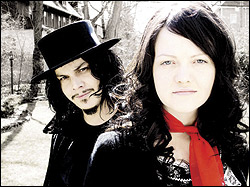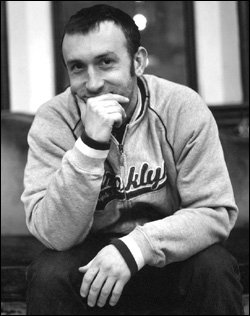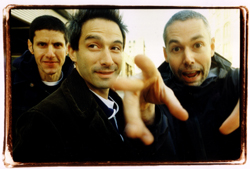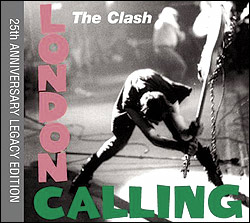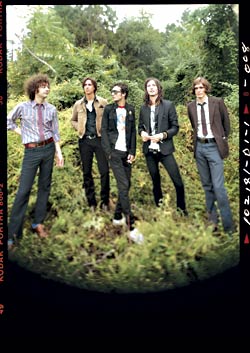Maybe it’s the baggage that makes the White Stripes great. Deliberate three- tone color schemes (red, white, and—increasingly with each successive album cover—black) and siblings-or-exes pseudo controversies were enough to ring a bit strange in their ’01–’02 breakthrough to mainstream consciousness. But then the meticulously reconstructed early-’60s studio atmosphere and labored “death of the sweetheart” liner notes of Elephant emerged, accompanied by a series of interviews that exposed Jack as the world’s youngest cranky old man. Subsequently, a band that would otherwise be simple to describe as “punk rock rediscovers Led Zeppelin II” or “Blues Explosion with schoolboy anxiety” became a perplexing exercise in self-conscious reconstructive hindsight, the kind of nostalgia act that knew its nostalgia was thirdhand but believed in it fervently anyway.
Extramusical diversion aside, the real crux of that nostalgia’s success was the guitar. Plenty of people used to play the way Jack does—that Anglo-blues that can turn on a dime into country or proto-metal, situation permitting—but none of them just turned 30 and is all up on MTV2 amidst the post-Thayil grind of alterna-rock’s sullen debris, churning away like he’s on a mission to shame them into silence. The odd paradox of that once omnipresent style re-emerging unchanged to sound startling and alien in the current pop atmosphere is a good reason for the White Stripes’ success, whether it’s boosted by nostalgianaut rockism or something more substantial.
And that’s one reason Get Behind Me Satan (V2) feels so reactionary. Jack seems set to prove that it wasn’t his instrument that made him, it was his riffs; and that if you can play a riff on an electric guitar, then you can play it on a piano. The lunatic aluminum squeal of “Blue Orchid” tossed a bone to the Guitar Center set and is one of the White Stripes’ catchiest songs, but it’s a decoy. Most of Satan doles out its best hooks to the ivory keys or acoustic guitars and leaves the amps for a couple slow-grind blues numbers—the Cole Porter codeine “Instinct Blues” and the twitchy mini–arena anthem “Red Rain”—that sound positively rote compared to the rest of the album. (Good-to-great, but rote.)
The idea of a piano-driven White Stripes song isn’t without precedent, from their debut’s fantastic wake-in-a-saloon version of “St. James Infirmary Blues” to the sparse, stirring “This Protector,” which closed White Blood Cells. But the prevalence of unplugged tracks over rock-out showbiz electricity is an unexpected sideways drift, and it’s enough to stir up speculation. The handful of negative reactions to Satan reveal a funny kind of bafflement: Many of its ideas and songs, if not the album in general, have been derided as sounding “unfinished.” People are just noticing this tendency now?
Actually, this sparseness makes for a fascinating change of pace. It takes some getting used to: the marimba-and-maraca-driven “The Nurse” insinuates a potential crescendo for what seems like eons, injecting snippets of a few non sequitur percussive whonks that sound like Meg (or maybe Jack) hitting the drum kit with a guitar before it builds to a peak that doesn’t so much swing as flail. “My Doorbell” plays its hand blatantly, rolling out with an instant Ben Folds–as–Al Kooper swagger and the best basic-Bonzo beat Meg’s ever laid down.
Her drumming in general hasn’t tightened up significantly, but even as the thinner sound of the album pulls Meg’s beats to a more prominent position, you can tell why the oft-rudimentary nature of her playing evokes a bit of sonic intrigue. Put someone like the Strokes’ human metronome Fab Moretti behind the kit for this and you lose the spontaneous, gut-feeling rattle that works to the White Stripes’ advantage. (The vinyl edition of Satan is rumored to be a complete one-take rerecording of the whole album, fittingly enough.) Just so long as she’s kept away from a microphone— Elephant‘s Meg-sung “In the Cold, Cold Night” was passable, but Satan‘s half- minute interlude “Passive Manipulation” is sub-Shaggs tone-deaf—her presence is crucial, every bit as integral to the sound as that now-sparse guitar.
But there’s another facet to the album’s reactionary bent: Jack’s lyrics have never been more consistently neurotic. His singing voice contains some Robert Plant, but more and more he’s starting to sound like Eric Burdon as Samuel Beckett. Satan‘s lyrics are frequently accusatory: The wailed “You got a reaction, didn’t you?” and “How dare you?” of “Blue Orchid” jab like bone-stiff fingers, and Robert Mitchum’s Night of the Hunter preacher emerges to scowl, “If there is a lie, then there is a liar, too/And if there is a sin, then there is a sinner, too,” on “Red Rain.” Self-doubt riddles the disc. The funeral march “White Moon” is a lamentation of easily manipulated nowhere-fast tendencies strewn with dead friends; the deceptively upbeat bluegrass “Little Ghost” posits Jack’s last shot at love being one with a woman who isn’t there; “As Ugly As I Seem” is self-explanatory.
And “Take, Take, Take,” the story of an enraptured Rita Hayworth fan, puts Jack in both positions: the awe-struck kid who stumbles on a chance encounter with a star and knows he’s overextending his need for her appreciation, and as Hayworth, too, being badgered by someone she trusted to remain at a reasonable distance. If it’s strange how Jack makes it easy to enjoy such stripped-bare, harrowing stress, it may be because few other rock stars at his level have approached his level of strangeness.
The White Stripes play the Gorge Amphitheatre, 754 Silica Road N.W., George, 206-628-0888, with Sleater-Kinney and the Greenhornes at 7 p.m. Sat., Aug. 6. $39.50.
